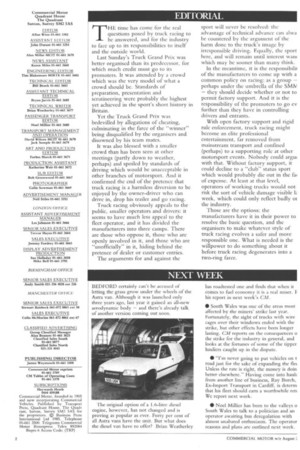EDITORIAL
Page 4

If you've noticed an error in this article please click here to report it so we can fix it.
THE time has come for the real questions posed by truck racing to be answered, and for the industry to face up to its responsibilities to itself and the outside world.
Last Sunday's Truck Grand Prix was better organised than its predecessor, for which much credit must go to its promoters. It was attended by a crowd which was the very model of what a crowd should be. Standards of preparation, presentation and scrutineering were probably the highest yet achieved in the sport's short history in Britain.
Yet the Truck Grand Prix was bedevilled by allegations of cheating, culminating in the farce of the "winner" being disqualified by the organisers and disowned by his team mates.
It was also blessed with a smaller crowd than has been seen at other meetings (partly down to weather, perhaps) and spoiled by standards of driving which would be unacceptable in other branches of motorsport. And it confirmed the end of the pretence that truck racing is a harmless diversion to be enjoyed by the owner-driver who can drive in, drop his trailer and go racing.
Truck racing obviously appeals to the public, smaller operators and drivers: it seems to have much less appeal to the fleet operator, and it has divided the manufacturers into three camps. There are those who oppose it, those who are openly involved in it, and those who are "unofficially' in it, hiding behind the pretence of dealer or customer entries.
The arguments for and against the sport will never be resolved: the advantage of technical advance can alwa be countered by the argument of the harm done to the truck's image by irresponsible driving. Equally, the sport here, and will remain until interest wan( which may be sooner than many think.
In the meantime, it is the responsibilii of the manufacturers to come up with a common policy on racing: as a group — perhaps under the umbrella of the SMIV — they should decide whether or not to permit factory support And it is the responsibility of the promoters to go ev further than they have in controlling drivers and entrants.
With open factory support and rigid rule enforcement, truck racing might become an elite professional entertainment, far removed from mainstream transport and confined (perhaps) to a supporting role at other motc.)rsport events. Nobody could argu( with that. Without factory support, it could decline to a "club" status sport which would probably die out in the fa4 of expense. At least at that level, operators of working trucks would not risk the sort of vehicle damage visible h week, which could only reflect badly or the industry.
Those are the options: the manufacturers have it in their power to resolve the basic question, and the organisers to make whatever style of truck racing evolves a safer and more responsible one. What is needed is the willpower to do something about it before truck racing degenerates into a two-ring farce.




































































